Economic, Environmental, and Social Effects of Hosting the Olympics
VerifiedAdded on 2023/01/05
|10
|2993
|91
Report
AI Summary
This report examines the multifaceted impacts of hosting global events like the Olympics, focusing on economic, environmental, and societal effects. It analyzes the economic opportunities, such as job creation and business development, while also addressing the costs to taxpayers and the long-term economic implications. The report emphasizes the importance of environmental impact assessments, sustainable practices, and carbon management strategies to mitigate negative environmental consequences, including pollution and resource depletion. It also explores the societal impacts on local communities, including cultural exchange and the development of new skills. The report concludes with recommendations for governments and organizing committees to maximize the positive effects and minimize the negative impacts of hosting the Olympics, ensuring a balanced approach to infrastructure development, community engagement, and environmental stewardship.

Academic and
Professional Skills
1
Professional Skills
1
Paraphrase This Document
Need a fresh take? Get an instant paraphrase of this document with our AI Paraphraser
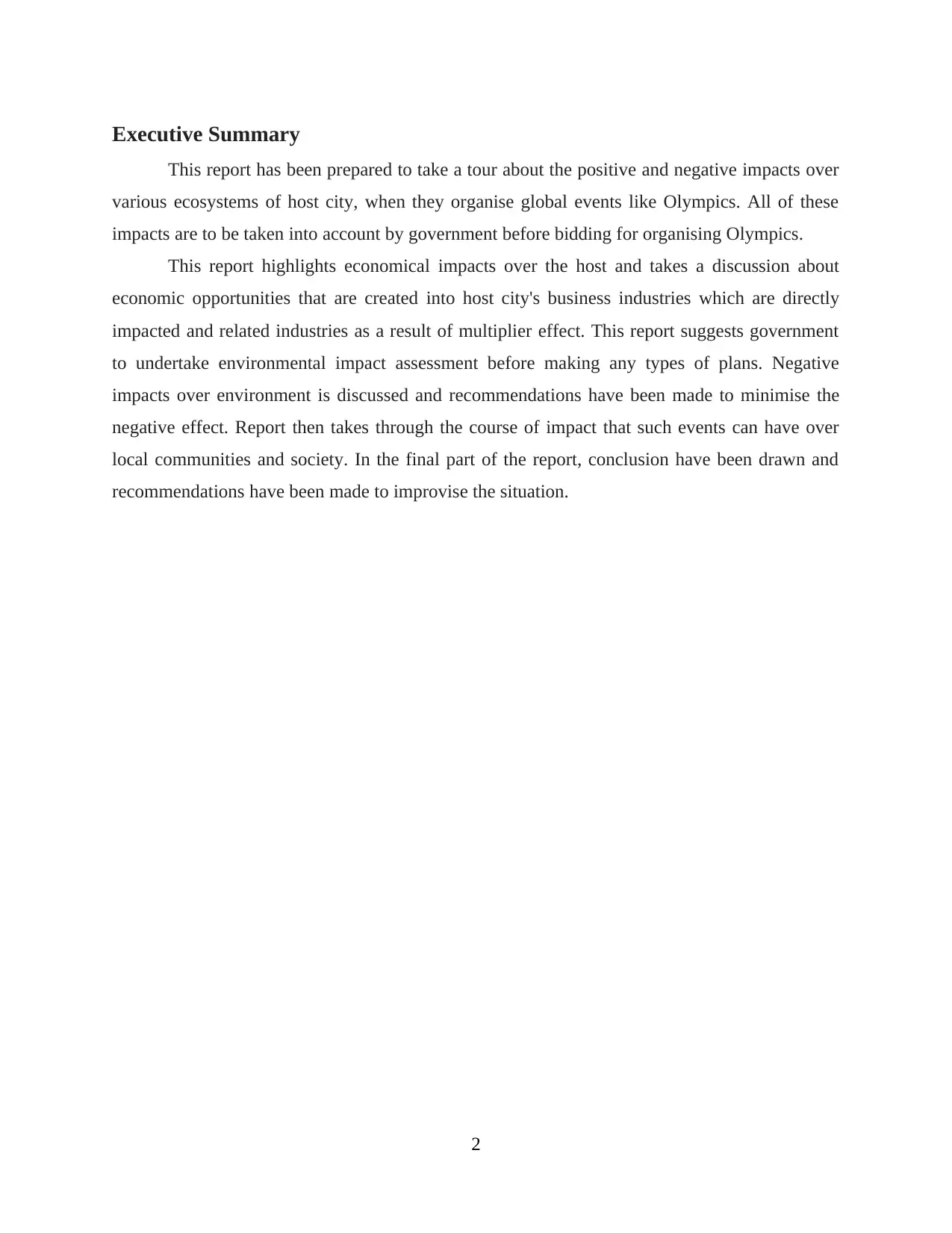
Executive Summary
This report has been prepared to take a tour about the positive and negative impacts over
various ecosystems of host city, when they organise global events like Olympics. All of these
impacts are to be taken into account by government before bidding for organising Olympics.
This report highlights economical impacts over the host and takes a discussion about
economic opportunities that are created into host city's business industries which are directly
impacted and related industries as a result of multiplier effect. This report suggests government
to undertake environmental impact assessment before making any types of plans. Negative
impacts over environment is discussed and recommendations have been made to minimise the
negative effect. Report then takes through the course of impact that such events can have over
local communities and society. In the final part of the report, conclusion have been drawn and
recommendations have been made to improvise the situation.
2
This report has been prepared to take a tour about the positive and negative impacts over
various ecosystems of host city, when they organise global events like Olympics. All of these
impacts are to be taken into account by government before bidding for organising Olympics.
This report highlights economical impacts over the host and takes a discussion about
economic opportunities that are created into host city's business industries which are directly
impacted and related industries as a result of multiplier effect. This report suggests government
to undertake environmental impact assessment before making any types of plans. Negative
impacts over environment is discussed and recommendations have been made to minimise the
negative effect. Report then takes through the course of impact that such events can have over
local communities and society. In the final part of the report, conclusion have been drawn and
recommendations have been made to improvise the situation.
2
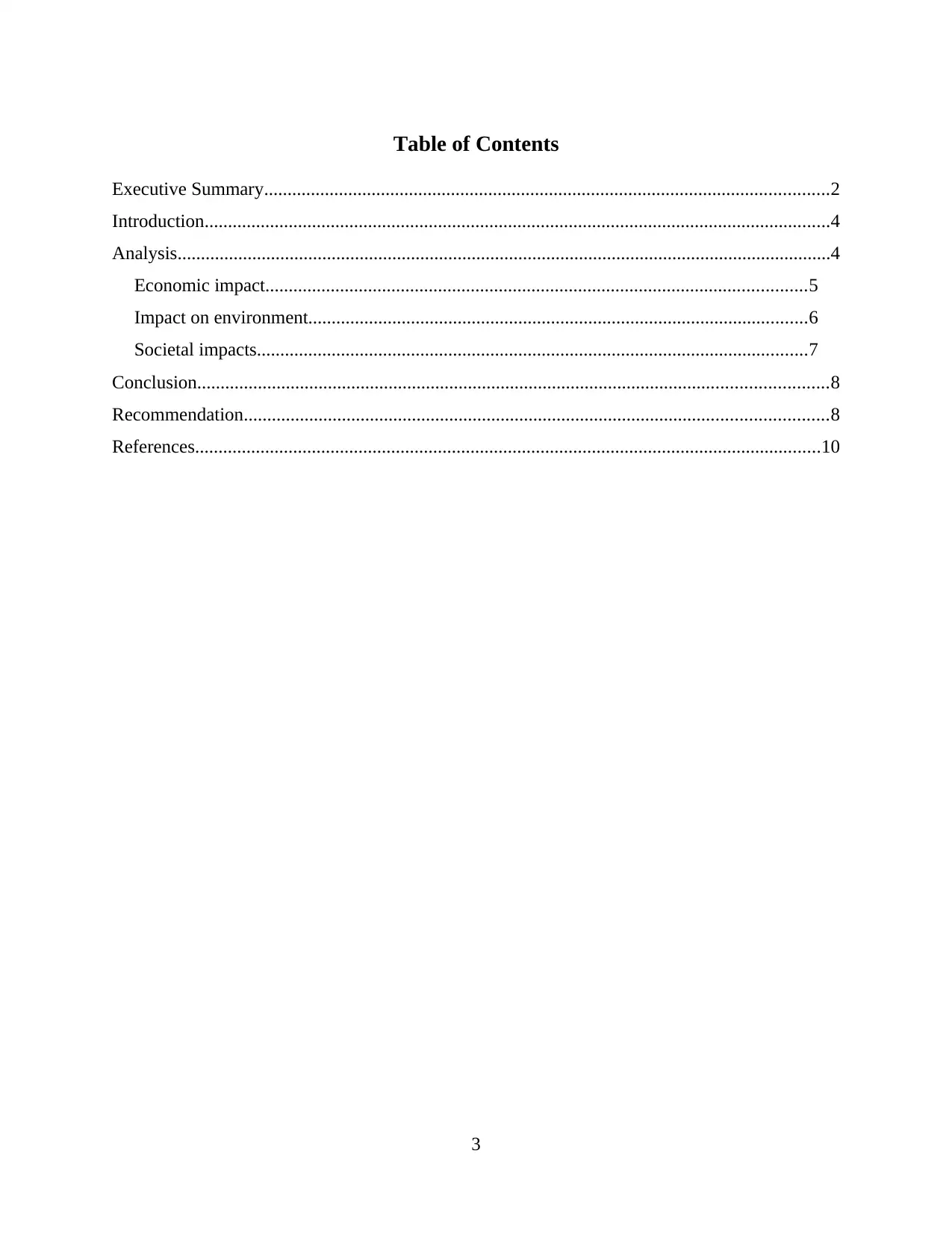
Table of Contents
Executive Summary.........................................................................................................................2
Introduction......................................................................................................................................4
Analysis............................................................................................................................................4
Economic impact....................................................................................................................5
Impact on environment...........................................................................................................6
Societal impacts......................................................................................................................7
Conclusion.......................................................................................................................................8
Recommendation.............................................................................................................................8
References......................................................................................................................................10
3
Executive Summary.........................................................................................................................2
Introduction......................................................................................................................................4
Analysis............................................................................................................................................4
Economic impact....................................................................................................................5
Impact on environment...........................................................................................................6
Societal impacts......................................................................................................................7
Conclusion.......................................................................................................................................8
Recommendation.............................................................................................................................8
References......................................................................................................................................10
3
⊘ This is a preview!⊘
Do you want full access?
Subscribe today to unlock all pages.

Trusted by 1+ million students worldwide
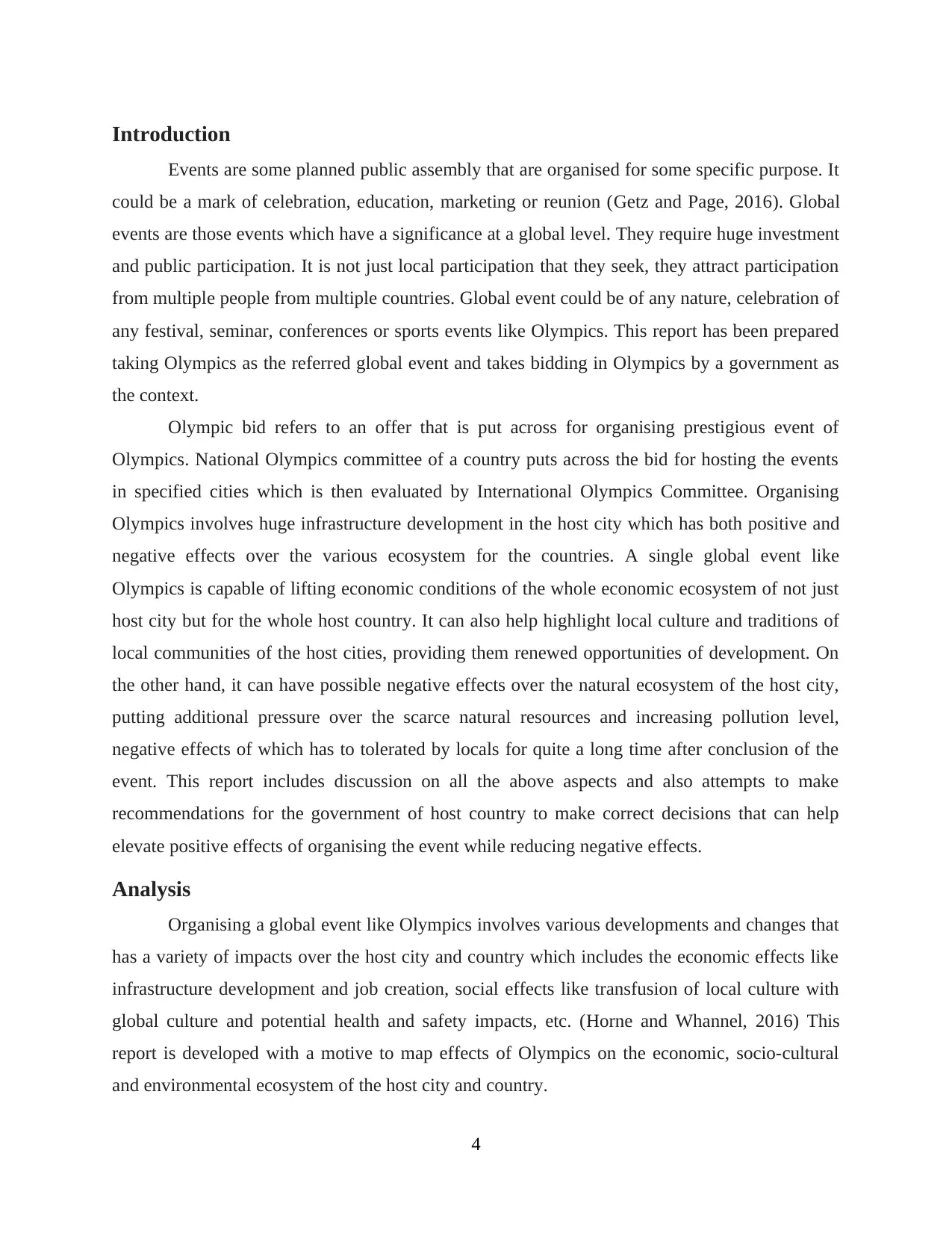
Introduction
Events are some planned public assembly that are organised for some specific purpose. It
could be a mark of celebration, education, marketing or reunion (Getz and Page, 2016). Global
events are those events which have a significance at a global level. They require huge investment
and public participation. It is not just local participation that they seek, they attract participation
from multiple people from multiple countries. Global event could be of any nature, celebration of
any festival, seminar, conferences or sports events like Olympics. This report has been prepared
taking Olympics as the referred global event and takes bidding in Olympics by a government as
the context.
Olympic bid refers to an offer that is put across for organising prestigious event of
Olympics. National Olympics committee of a country puts across the bid for hosting the events
in specified cities which is then evaluated by International Olympics Committee. Organising
Olympics involves huge infrastructure development in the host city which has both positive and
negative effects over the various ecosystem for the countries. A single global event like
Olympics is capable of lifting economic conditions of the whole economic ecosystem of not just
host city but for the whole host country. It can also help highlight local culture and traditions of
local communities of the host cities, providing them renewed opportunities of development. On
the other hand, it can have possible negative effects over the natural ecosystem of the host city,
putting additional pressure over the scarce natural resources and increasing pollution level,
negative effects of which has to tolerated by locals for quite a long time after conclusion of the
event. This report includes discussion on all the above aspects and also attempts to make
recommendations for the government of host country to make correct decisions that can help
elevate positive effects of organising the event while reducing negative effects.
Analysis
Organising a global event like Olympics involves various developments and changes that
has a variety of impacts over the host city and country which includes the economic effects like
infrastructure development and job creation, social effects like transfusion of local culture with
global culture and potential health and safety impacts, etc. (Horne and Whannel, 2016) This
report is developed with a motive to map effects of Olympics on the economic, socio-cultural
and environmental ecosystem of the host city and country.
4
Events are some planned public assembly that are organised for some specific purpose. It
could be a mark of celebration, education, marketing or reunion (Getz and Page, 2016). Global
events are those events which have a significance at a global level. They require huge investment
and public participation. It is not just local participation that they seek, they attract participation
from multiple people from multiple countries. Global event could be of any nature, celebration of
any festival, seminar, conferences or sports events like Olympics. This report has been prepared
taking Olympics as the referred global event and takes bidding in Olympics by a government as
the context.
Olympic bid refers to an offer that is put across for organising prestigious event of
Olympics. National Olympics committee of a country puts across the bid for hosting the events
in specified cities which is then evaluated by International Olympics Committee. Organising
Olympics involves huge infrastructure development in the host city which has both positive and
negative effects over the various ecosystem for the countries. A single global event like
Olympics is capable of lifting economic conditions of the whole economic ecosystem of not just
host city but for the whole host country. It can also help highlight local culture and traditions of
local communities of the host cities, providing them renewed opportunities of development. On
the other hand, it can have possible negative effects over the natural ecosystem of the host city,
putting additional pressure over the scarce natural resources and increasing pollution level,
negative effects of which has to tolerated by locals for quite a long time after conclusion of the
event. This report includes discussion on all the above aspects and also attempts to make
recommendations for the government of host country to make correct decisions that can help
elevate positive effects of organising the event while reducing negative effects.
Analysis
Organising a global event like Olympics involves various developments and changes that
has a variety of impacts over the host city and country which includes the economic effects like
infrastructure development and job creation, social effects like transfusion of local culture with
global culture and potential health and safety impacts, etc. (Horne and Whannel, 2016) This
report is developed with a motive to map effects of Olympics on the economic, socio-cultural
and environmental ecosystem of the host city and country.
4
Paraphrase This Document
Need a fresh take? Get an instant paraphrase of this document with our AI Paraphraser
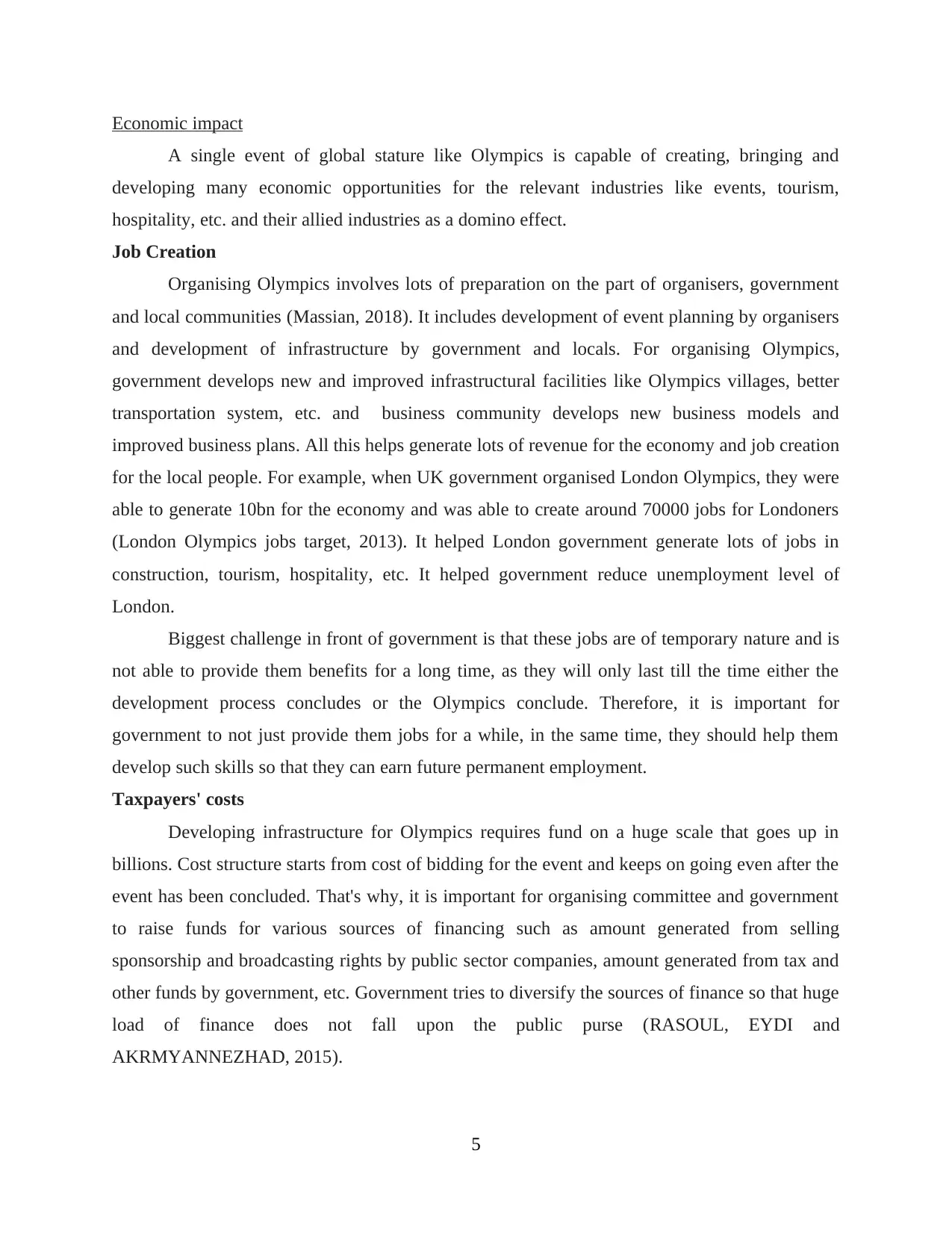
Economic impact
A single event of global stature like Olympics is capable of creating, bringing and
developing many economic opportunities for the relevant industries like events, tourism,
hospitality, etc. and their allied industries as a domino effect.
Job Creation
Organising Olympics involves lots of preparation on the part of organisers, government
and local communities (Massian, 2018). It includes development of event planning by organisers
and development of infrastructure by government and locals. For organising Olympics,
government develops new and improved infrastructural facilities like Olympics villages, better
transportation system, etc. and business community develops new business models and
improved business plans. All this helps generate lots of revenue for the economy and job creation
for the local people. For example, when UK government organised London Olympics, they were
able to generate 10bn for the economy and was able to create around 70000 jobs for Londoners
(London Olympics jobs target, 2013). It helped London government generate lots of jobs in
construction, tourism, hospitality, etc. It helped government reduce unemployment level of
London.
Biggest challenge in front of government is that these jobs are of temporary nature and is
not able to provide them benefits for a long time, as they will only last till the time either the
development process concludes or the Olympics conclude. Therefore, it is important for
government to not just provide them jobs for a while, in the same time, they should help them
develop such skills so that they can earn future permanent employment.
Taxpayers' costs
Developing infrastructure for Olympics requires fund on a huge scale that goes up in
billions. Cost structure starts from cost of bidding for the event and keeps on going even after the
event has been concluded. That's why, it is important for organising committee and government
to raise funds for various sources of financing such as amount generated from selling
sponsorship and broadcasting rights by public sector companies, amount generated from tax and
other funds by government, etc. Government tries to diversify the sources of finance so that huge
load of finance does not fall upon the public purse (RASOUL, EYDI and
AKRMYANNEZHAD, 2015).
5
A single event of global stature like Olympics is capable of creating, bringing and
developing many economic opportunities for the relevant industries like events, tourism,
hospitality, etc. and their allied industries as a domino effect.
Job Creation
Organising Olympics involves lots of preparation on the part of organisers, government
and local communities (Massian, 2018). It includes development of event planning by organisers
and development of infrastructure by government and locals. For organising Olympics,
government develops new and improved infrastructural facilities like Olympics villages, better
transportation system, etc. and business community develops new business models and
improved business plans. All this helps generate lots of revenue for the economy and job creation
for the local people. For example, when UK government organised London Olympics, they were
able to generate 10bn for the economy and was able to create around 70000 jobs for Londoners
(London Olympics jobs target, 2013). It helped London government generate lots of jobs in
construction, tourism, hospitality, etc. It helped government reduce unemployment level of
London.
Biggest challenge in front of government is that these jobs are of temporary nature and is
not able to provide them benefits for a long time, as they will only last till the time either the
development process concludes or the Olympics conclude. Therefore, it is important for
government to not just provide them jobs for a while, in the same time, they should help them
develop such skills so that they can earn future permanent employment.
Taxpayers' costs
Developing infrastructure for Olympics requires fund on a huge scale that goes up in
billions. Cost structure starts from cost of bidding for the event and keeps on going even after the
event has been concluded. That's why, it is important for organising committee and government
to raise funds for various sources of financing such as amount generated from selling
sponsorship and broadcasting rights by public sector companies, amount generated from tax and
other funds by government, etc. Government tries to diversify the sources of finance so that huge
load of finance does not fall upon the public purse (RASOUL, EYDI and
AKRMYANNEZHAD, 2015).
5
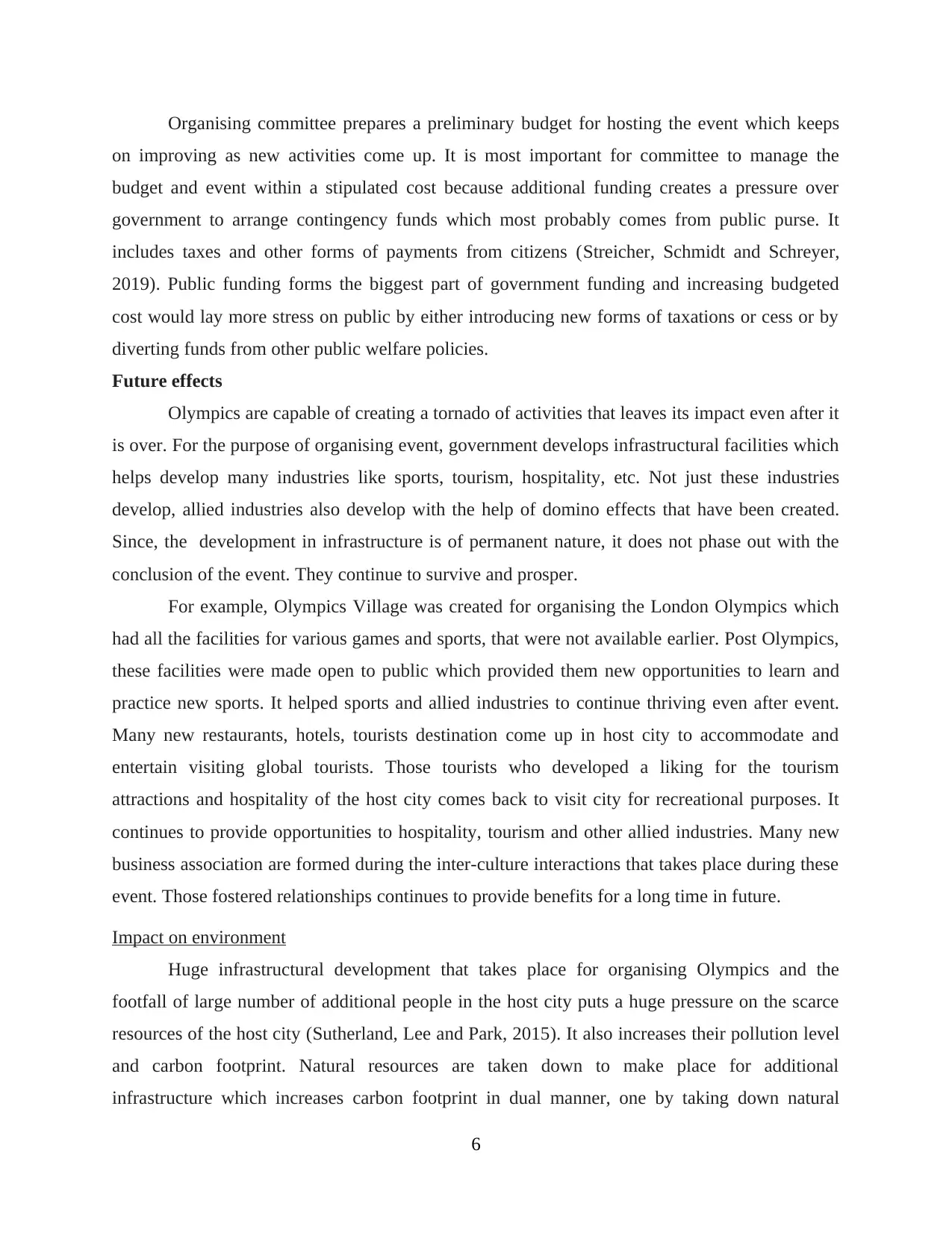
Organising committee prepares a preliminary budget for hosting the event which keeps
on improving as new activities come up. It is most important for committee to manage the
budget and event within a stipulated cost because additional funding creates a pressure over
government to arrange contingency funds which most probably comes from public purse. It
includes taxes and other forms of payments from citizens (Streicher, Schmidt and Schreyer,
2019). Public funding forms the biggest part of government funding and increasing budgeted
cost would lay more stress on public by either introducing new forms of taxations or cess or by
diverting funds from other public welfare policies.
Future effects
Olympics are capable of creating a tornado of activities that leaves its impact even after it
is over. For the purpose of organising event, government develops infrastructural facilities which
helps develop many industries like sports, tourism, hospitality, etc. Not just these industries
develop, allied industries also develop with the help of domino effects that have been created.
Since, the development in infrastructure is of permanent nature, it does not phase out with the
conclusion of the event. They continue to survive and prosper.
For example, Olympics Village was created for organising the London Olympics which
had all the facilities for various games and sports, that were not available earlier. Post Olympics,
these facilities were made open to public which provided them new opportunities to learn and
practice new sports. It helped sports and allied industries to continue thriving even after event.
Many new restaurants, hotels, tourists destination come up in host city to accommodate and
entertain visiting global tourists. Those tourists who developed a liking for the tourism
attractions and hospitality of the host city comes back to visit city for recreational purposes. It
continues to provide opportunities to hospitality, tourism and other allied industries. Many new
business association are formed during the inter-culture interactions that takes place during these
event. Those fostered relationships continues to provide benefits for a long time in future.
Impact on environment
Huge infrastructural development that takes place for organising Olympics and the
footfall of large number of additional people in the host city puts a huge pressure on the scarce
resources of the host city (Sutherland, Lee and Park, 2015). It also increases their pollution level
and carbon footprint. Natural resources are taken down to make place for additional
infrastructure which increases carbon footprint in dual manner, one by taking down natural
6
on improving as new activities come up. It is most important for committee to manage the
budget and event within a stipulated cost because additional funding creates a pressure over
government to arrange contingency funds which most probably comes from public purse. It
includes taxes and other forms of payments from citizens (Streicher, Schmidt and Schreyer,
2019). Public funding forms the biggest part of government funding and increasing budgeted
cost would lay more stress on public by either introducing new forms of taxations or cess or by
diverting funds from other public welfare policies.
Future effects
Olympics are capable of creating a tornado of activities that leaves its impact even after it
is over. For the purpose of organising event, government develops infrastructural facilities which
helps develop many industries like sports, tourism, hospitality, etc. Not just these industries
develop, allied industries also develop with the help of domino effects that have been created.
Since, the development in infrastructure is of permanent nature, it does not phase out with the
conclusion of the event. They continue to survive and prosper.
For example, Olympics Village was created for organising the London Olympics which
had all the facilities for various games and sports, that were not available earlier. Post Olympics,
these facilities were made open to public which provided them new opportunities to learn and
practice new sports. It helped sports and allied industries to continue thriving even after event.
Many new restaurants, hotels, tourists destination come up in host city to accommodate and
entertain visiting global tourists. Those tourists who developed a liking for the tourism
attractions and hospitality of the host city comes back to visit city for recreational purposes. It
continues to provide opportunities to hospitality, tourism and other allied industries. Many new
business association are formed during the inter-culture interactions that takes place during these
event. Those fostered relationships continues to provide benefits for a long time in future.
Impact on environment
Huge infrastructural development that takes place for organising Olympics and the
footfall of large number of additional people in the host city puts a huge pressure on the scarce
resources of the host city (Sutherland, Lee and Park, 2015). It also increases their pollution level
and carbon footprint. Natural resources are taken down to make place for additional
infrastructure which increases carbon footprint in dual manner, one by taking down natural
6
⊘ This is a preview!⊘
Do you want full access?
Subscribe today to unlock all pages.

Trusted by 1+ million students worldwide
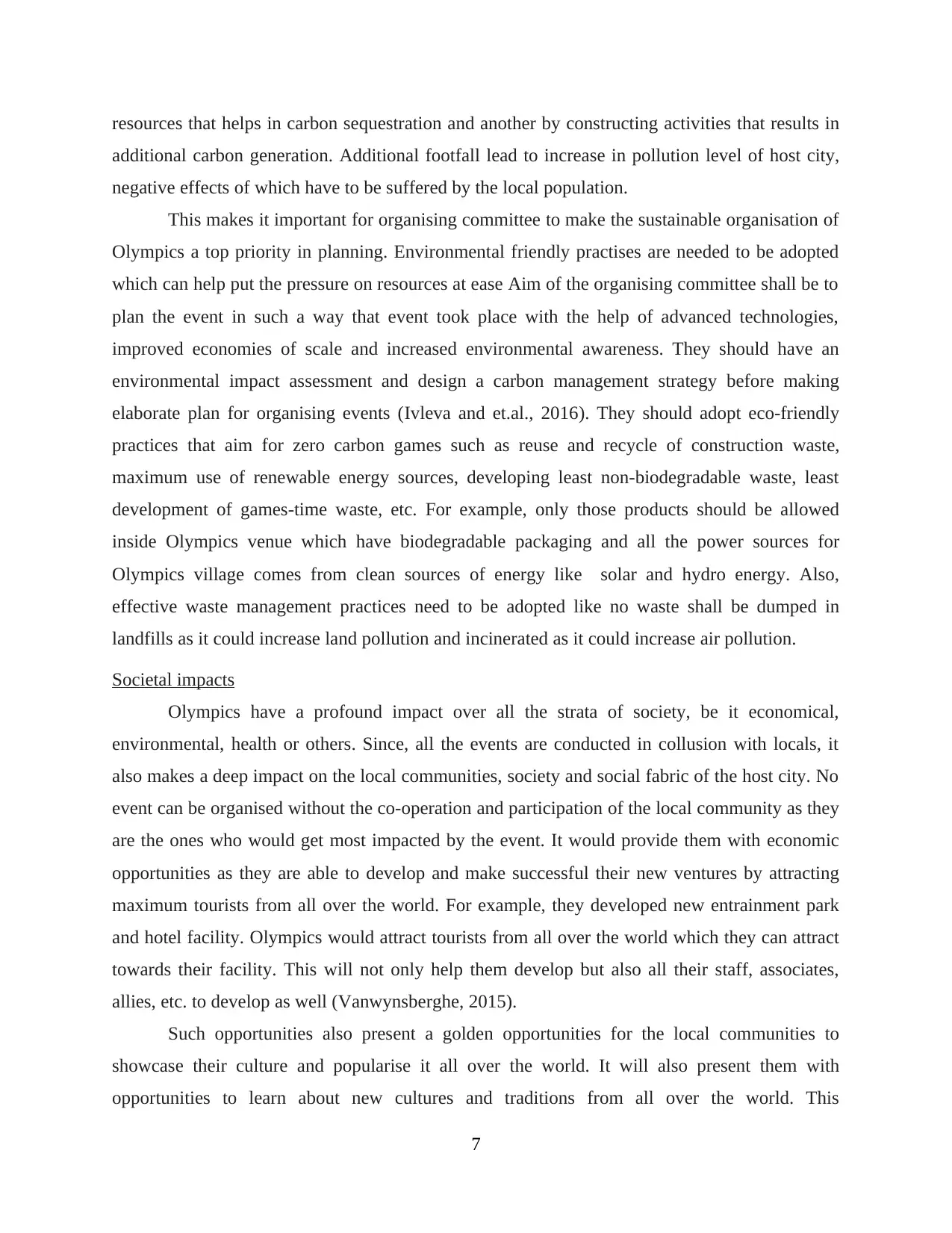
resources that helps in carbon sequestration and another by constructing activities that results in
additional carbon generation. Additional footfall lead to increase in pollution level of host city,
negative effects of which have to be suffered by the local population.
This makes it important for organising committee to make the sustainable organisation of
Olympics a top priority in planning. Environmental friendly practises are needed to be adopted
which can help put the pressure on resources at ease Aim of the organising committee shall be to
plan the event in such a way that event took place with the help of advanced technologies,
improved economies of scale and increased environmental awareness. They should have an
environmental impact assessment and design a carbon management strategy before making
elaborate plan for organising events (Ivleva and et.al., 2016). They should adopt eco-friendly
practices that aim for zero carbon games such as reuse and recycle of construction waste,
maximum use of renewable energy sources, developing least non-biodegradable waste, least
development of games-time waste, etc. For example, only those products should be allowed
inside Olympics venue which have biodegradable packaging and all the power sources for
Olympics village comes from clean sources of energy like solar and hydro energy. Also,
effective waste management practices need to be adopted like no waste shall be dumped in
landfills as it could increase land pollution and incinerated as it could increase air pollution.
Societal impacts
Olympics have a profound impact over all the strata of society, be it economical,
environmental, health or others. Since, all the events are conducted in collusion with locals, it
also makes a deep impact on the local communities, society and social fabric of the host city. No
event can be organised without the co-operation and participation of the local community as they
are the ones who would get most impacted by the event. It would provide them with economic
opportunities as they are able to develop and make successful their new ventures by attracting
maximum tourists from all over the world. For example, they developed new entrainment park
and hotel facility. Olympics would attract tourists from all over the world which they can attract
towards their facility. This will not only help them develop but also all their staff, associates,
allies, etc. to develop as well (Vanwynsberghe, 2015).
Such opportunities also present a golden opportunities for the local communities to
showcase their culture and popularise it all over the world. It will also present them with
opportunities to learn about new cultures and traditions from all over the world. This
7
additional carbon generation. Additional footfall lead to increase in pollution level of host city,
negative effects of which have to be suffered by the local population.
This makes it important for organising committee to make the sustainable organisation of
Olympics a top priority in planning. Environmental friendly practises are needed to be adopted
which can help put the pressure on resources at ease Aim of the organising committee shall be to
plan the event in such a way that event took place with the help of advanced technologies,
improved economies of scale and increased environmental awareness. They should have an
environmental impact assessment and design a carbon management strategy before making
elaborate plan for organising events (Ivleva and et.al., 2016). They should adopt eco-friendly
practices that aim for zero carbon games such as reuse and recycle of construction waste,
maximum use of renewable energy sources, developing least non-biodegradable waste, least
development of games-time waste, etc. For example, only those products should be allowed
inside Olympics venue which have biodegradable packaging and all the power sources for
Olympics village comes from clean sources of energy like solar and hydro energy. Also,
effective waste management practices need to be adopted like no waste shall be dumped in
landfills as it could increase land pollution and incinerated as it could increase air pollution.
Societal impacts
Olympics have a profound impact over all the strata of society, be it economical,
environmental, health or others. Since, all the events are conducted in collusion with locals, it
also makes a deep impact on the local communities, society and social fabric of the host city. No
event can be organised without the co-operation and participation of the local community as they
are the ones who would get most impacted by the event. It would provide them with economic
opportunities as they are able to develop and make successful their new ventures by attracting
maximum tourists from all over the world. For example, they developed new entrainment park
and hotel facility. Olympics would attract tourists from all over the world which they can attract
towards their facility. This will not only help them develop but also all their staff, associates,
allies, etc. to develop as well (Vanwynsberghe, 2015).
Such opportunities also present a golden opportunities for the local communities to
showcase their culture and popularise it all over the world. It will also present them with
opportunities to learn about new cultures and traditions from all over the world. This
7
Paraphrase This Document
Need a fresh take? Get an instant paraphrase of this document with our AI Paraphraser
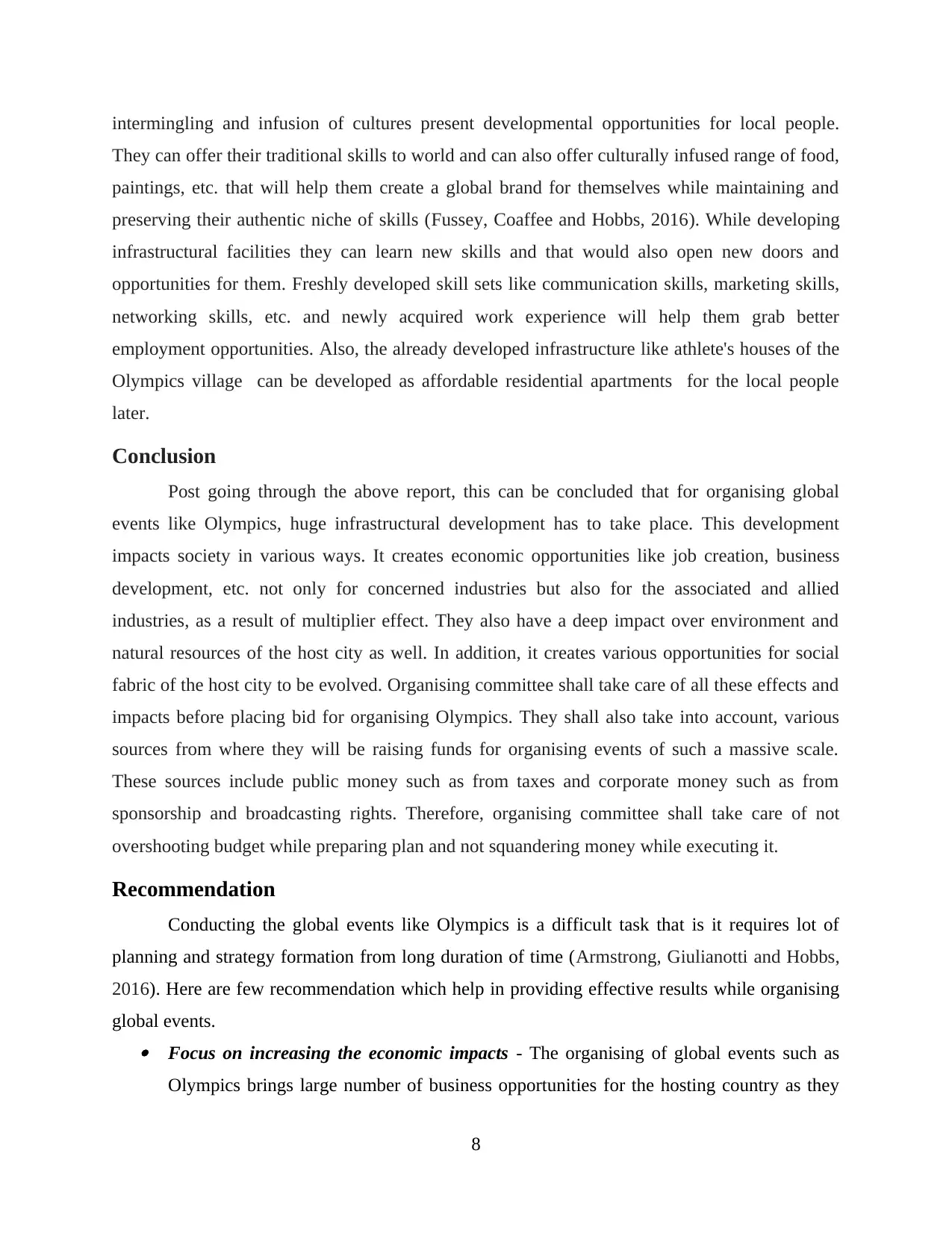
intermingling and infusion of cultures present developmental opportunities for local people.
They can offer their traditional skills to world and can also offer culturally infused range of food,
paintings, etc. that will help them create a global brand for themselves while maintaining and
preserving their authentic niche of skills (Fussey, Coaffee and Hobbs, 2016). While developing
infrastructural facilities they can learn new skills and that would also open new doors and
opportunities for them. Freshly developed skill sets like communication skills, marketing skills,
networking skills, etc. and newly acquired work experience will help them grab better
employment opportunities. Also, the already developed infrastructure like athlete's houses of the
Olympics village can be developed as affordable residential apartments for the local people
later.
Conclusion
Post going through the above report, this can be concluded that for organising global
events like Olympics, huge infrastructural development has to take place. This development
impacts society in various ways. It creates economic opportunities like job creation, business
development, etc. not only for concerned industries but also for the associated and allied
industries, as a result of multiplier effect. They also have a deep impact over environment and
natural resources of the host city as well. In addition, it creates various opportunities for social
fabric of the host city to be evolved. Organising committee shall take care of all these effects and
impacts before placing bid for organising Olympics. They shall also take into account, various
sources from where they will be raising funds for organising events of such a massive scale.
These sources include public money such as from taxes and corporate money such as from
sponsorship and broadcasting rights. Therefore, organising committee shall take care of not
overshooting budget while preparing plan and not squandering money while executing it.
Recommendation
Conducting the global events like Olympics is a difficult task that is it requires lot of
planning and strategy formation from long duration of time (Armstrong, Giulianotti and Hobbs,
2016). Here are few recommendation which help in providing effective results while organising
global events. Focus on increasing the economic impacts - The organising of global events such as
Olympics brings large number of business opportunities for the hosting country as they
8
They can offer their traditional skills to world and can also offer culturally infused range of food,
paintings, etc. that will help them create a global brand for themselves while maintaining and
preserving their authentic niche of skills (Fussey, Coaffee and Hobbs, 2016). While developing
infrastructural facilities they can learn new skills and that would also open new doors and
opportunities for them. Freshly developed skill sets like communication skills, marketing skills,
networking skills, etc. and newly acquired work experience will help them grab better
employment opportunities. Also, the already developed infrastructure like athlete's houses of the
Olympics village can be developed as affordable residential apartments for the local people
later.
Conclusion
Post going through the above report, this can be concluded that for organising global
events like Olympics, huge infrastructural development has to take place. This development
impacts society in various ways. It creates economic opportunities like job creation, business
development, etc. not only for concerned industries but also for the associated and allied
industries, as a result of multiplier effect. They also have a deep impact over environment and
natural resources of the host city as well. In addition, it creates various opportunities for social
fabric of the host city to be evolved. Organising committee shall take care of all these effects and
impacts before placing bid for organising Olympics. They shall also take into account, various
sources from where they will be raising funds for organising events of such a massive scale.
These sources include public money such as from taxes and corporate money such as from
sponsorship and broadcasting rights. Therefore, organising committee shall take care of not
overshooting budget while preparing plan and not squandering money while executing it.
Recommendation
Conducting the global events like Olympics is a difficult task that is it requires lot of
planning and strategy formation from long duration of time (Armstrong, Giulianotti and Hobbs,
2016). Here are few recommendation which help in providing effective results while organising
global events. Focus on increasing the economic impacts - The organising of global events such as
Olympics brings large number of business opportunities for the hosting country as they
8
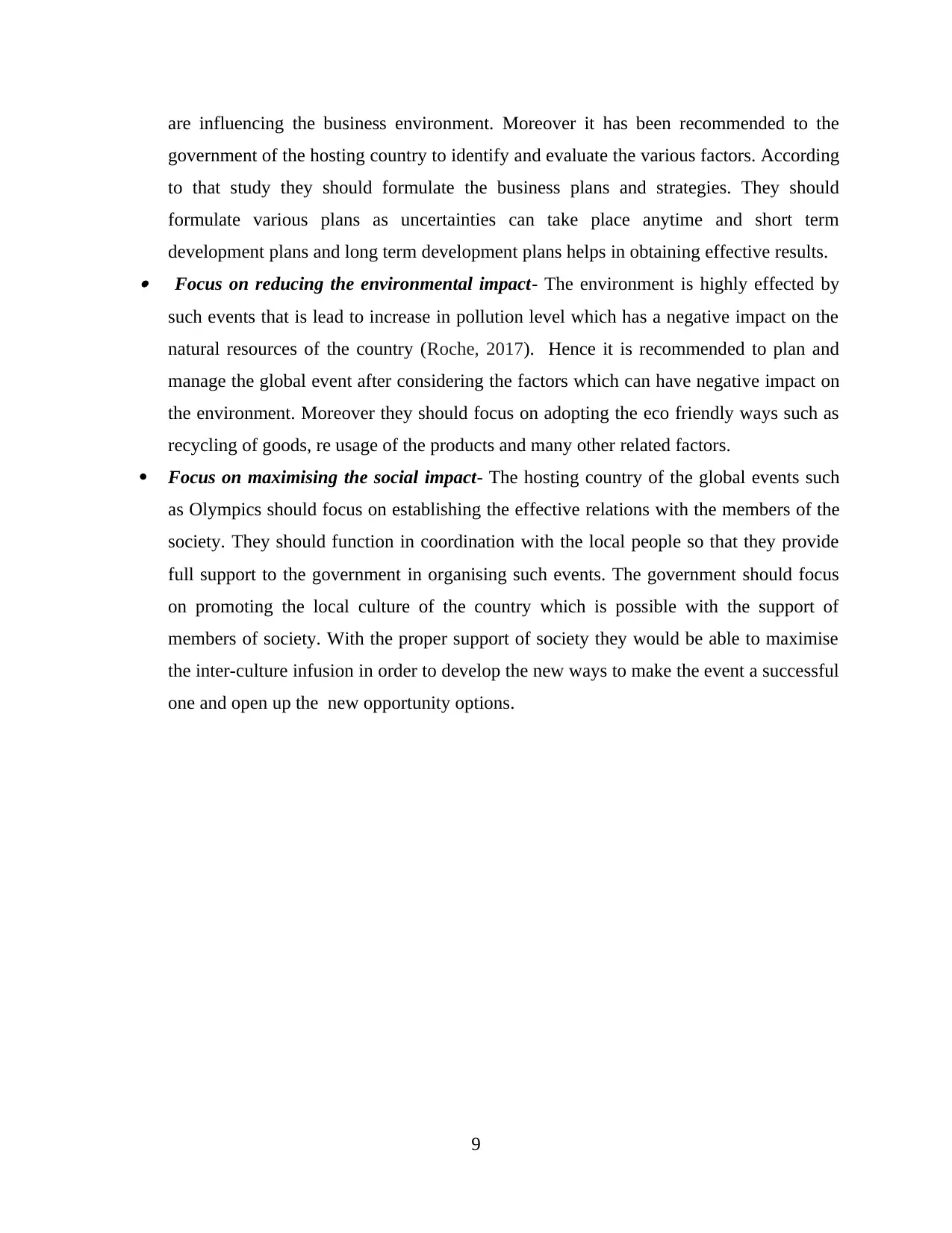
are influencing the business environment. Moreover it has been recommended to the
government of the hosting country to identify and evaluate the various factors. According
to that study they should formulate the business plans and strategies. They should
formulate various plans as uncertainties can take place anytime and short term
development plans and long term development plans helps in obtaining effective results. Focus on reducing the environmental impact- The environment is highly effected by
such events that is lead to increase in pollution level which has a negative impact on the
natural resources of the country (Roche, 2017). Hence it is recommended to plan and
manage the global event after considering the factors which can have negative impact on
the environment. Moreover they should focus on adopting the eco friendly ways such as
recycling of goods, re usage of the products and many other related factors.
Focus on maximising the social impact- The hosting country of the global events such
as Olympics should focus on establishing the effective relations with the members of the
society. They should function in coordination with the local people so that they provide
full support to the government in organising such events. The government should focus
on promoting the local culture of the country which is possible with the support of
members of society. With the proper support of society they would be able to maximise
the inter-culture infusion in order to develop the new ways to make the event a successful
one and open up the new opportunity options.
9
government of the hosting country to identify and evaluate the various factors. According
to that study they should formulate the business plans and strategies. They should
formulate various plans as uncertainties can take place anytime and short term
development plans and long term development plans helps in obtaining effective results. Focus on reducing the environmental impact- The environment is highly effected by
such events that is lead to increase in pollution level which has a negative impact on the
natural resources of the country (Roche, 2017). Hence it is recommended to plan and
manage the global event after considering the factors which can have negative impact on
the environment. Moreover they should focus on adopting the eco friendly ways such as
recycling of goods, re usage of the products and many other related factors.
Focus on maximising the social impact- The hosting country of the global events such
as Olympics should focus on establishing the effective relations with the members of the
society. They should function in coordination with the local people so that they provide
full support to the government in organising such events. The government should focus
on promoting the local culture of the country which is possible with the support of
members of society. With the proper support of society they would be able to maximise
the inter-culture infusion in order to develop the new ways to make the event a successful
one and open up the new opportunity options.
9
⊘ This is a preview!⊘
Do you want full access?
Subscribe today to unlock all pages.

Trusted by 1+ million students worldwide
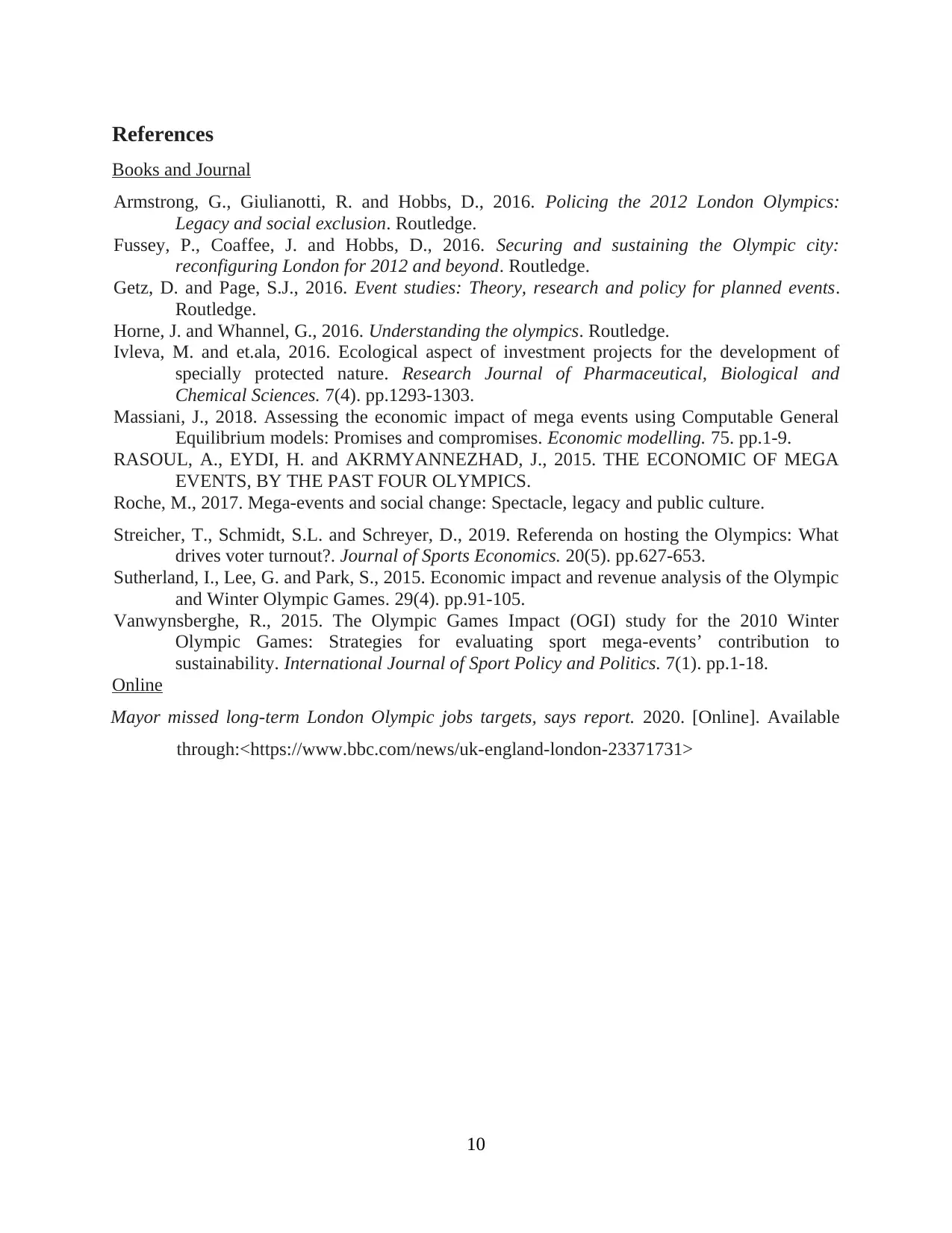
References
Books and Journal
Armstrong, G., Giulianotti, R. and Hobbs, D., 2016. Policing the 2012 London Olympics:
Legacy and social exclusion. Routledge.
Fussey, P., Coaffee, J. and Hobbs, D., 2016. Securing and sustaining the Olympic city:
reconfiguring London for 2012 and beyond. Routledge.
Getz, D. and Page, S.J., 2016. Event studies: Theory, research and policy for planned events.
Routledge.
Horne, J. and Whannel, G., 2016. Understanding the olympics. Routledge.
Ivleva, M. and et.ala, 2016. Ecological aspect of investment projects for the development of
specially protected nature. Research Journal of Pharmaceutical, Biological and
Chemical Sciences. 7(4). pp.1293-1303.
Massiani, J., 2018. Assessing the economic impact of mega events using Computable General
Equilibrium models: Promises and compromises. Economic modelling. 75. pp.1-9.
RASOUL, A., EYDI, H. and AKRMYANNEZHAD, J., 2015. THE ECONOMIC OF MEGA
EVENTS, BY THE PAST FOUR OLYMPICS.
Roche, M., 2017. Mega-events and social change: Spectacle, legacy and public culture.
Streicher, T., Schmidt, S.L. and Schreyer, D., 2019. Referenda on hosting the Olympics: What
drives voter turnout?. Journal of Sports Economics. 20(5). pp.627-653.
Sutherland, I., Lee, G. and Park, S., 2015. Economic impact and revenue analysis of the Olympic
and Winter Olympic Games. 29(4). pp.91-105.
Vanwynsberghe, R., 2015. The Olympic Games Impact (OGI) study for the 2010 Winter
Olympic Games: Strategies for evaluating sport mega-events’ contribution to
sustainability. International Journal of Sport Policy and Politics. 7(1). pp.1-18.
Online
Mayor missed long-term London Olympic jobs targets, says report. 2020. [Online]. Available
through:<https://www.bbc.com/news/uk-england-london-23371731>
10
Books and Journal
Armstrong, G., Giulianotti, R. and Hobbs, D., 2016. Policing the 2012 London Olympics:
Legacy and social exclusion. Routledge.
Fussey, P., Coaffee, J. and Hobbs, D., 2016. Securing and sustaining the Olympic city:
reconfiguring London for 2012 and beyond. Routledge.
Getz, D. and Page, S.J., 2016. Event studies: Theory, research and policy for planned events.
Routledge.
Horne, J. and Whannel, G., 2016. Understanding the olympics. Routledge.
Ivleva, M. and et.ala, 2016. Ecological aspect of investment projects for the development of
specially protected nature. Research Journal of Pharmaceutical, Biological and
Chemical Sciences. 7(4). pp.1293-1303.
Massiani, J., 2018. Assessing the economic impact of mega events using Computable General
Equilibrium models: Promises and compromises. Economic modelling. 75. pp.1-9.
RASOUL, A., EYDI, H. and AKRMYANNEZHAD, J., 2015. THE ECONOMIC OF MEGA
EVENTS, BY THE PAST FOUR OLYMPICS.
Roche, M., 2017. Mega-events and social change: Spectacle, legacy and public culture.
Streicher, T., Schmidt, S.L. and Schreyer, D., 2019. Referenda on hosting the Olympics: What
drives voter turnout?. Journal of Sports Economics. 20(5). pp.627-653.
Sutherland, I., Lee, G. and Park, S., 2015. Economic impact and revenue analysis of the Olympic
and Winter Olympic Games. 29(4). pp.91-105.
Vanwynsberghe, R., 2015. The Olympic Games Impact (OGI) study for the 2010 Winter
Olympic Games: Strategies for evaluating sport mega-events’ contribution to
sustainability. International Journal of Sport Policy and Politics. 7(1). pp.1-18.
Online
Mayor missed long-term London Olympic jobs targets, says report. 2020. [Online]. Available
through:<https://www.bbc.com/news/uk-england-london-23371731>
10
1 out of 10
Related Documents
Your All-in-One AI-Powered Toolkit for Academic Success.
+13062052269
info@desklib.com
Available 24*7 on WhatsApp / Email
![[object Object]](/_next/static/media/star-bottom.7253800d.svg)
Unlock your academic potential
Copyright © 2020–2026 A2Z Services. All Rights Reserved. Developed and managed by ZUCOL.





